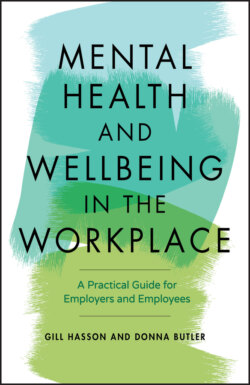Читать книгу Mental Health and Wellbeing in the Workplace - Gill Hasson - Страница 17
Stress
ОглавлениеStress isn't a psychiatric diagnosis, but, say the mental health charity Mind, ‘it's closely linked to your mental health in two important ways:
Stress can cause mental health problems, and make existing problems worse. For example, if you often struggle to manage feelings of stress, you might develop a mental health problem like anxiety or depression.
Mental health problems can cause stress. You might find coping with the day-to-day symptoms of your mental health problem, as well as potentially needing to manage medication, healthcare appointments or treatments, can become extra sources of stress.
This can start to feel like a vicious circle, and it might be hard to see where stress ends and your mental health problem begins.’
Emotional and physical responses:
Overwhelmed, worried
A sense of dread
Racing thoughts that won't switch off
Unable to concentrate, indecisive
Being wound up, irritable, impatient, aggressive
Muscle tension
Headaches
Chest pains
Indigestion or heartburn
Constipation or diarrhoea
Feeling sick, dizzy, or faint.
How you might behave:
Avoiding situations that are overwhelming you
Being tearful, snapping at people
Being unable to sit still
Eating more or less than usual
Smoking, drinking, or taking drugs ‘to cope’
Sleep problems.
Stress can lead to either or both of the two most common mental health problems: anxiety and depression.
